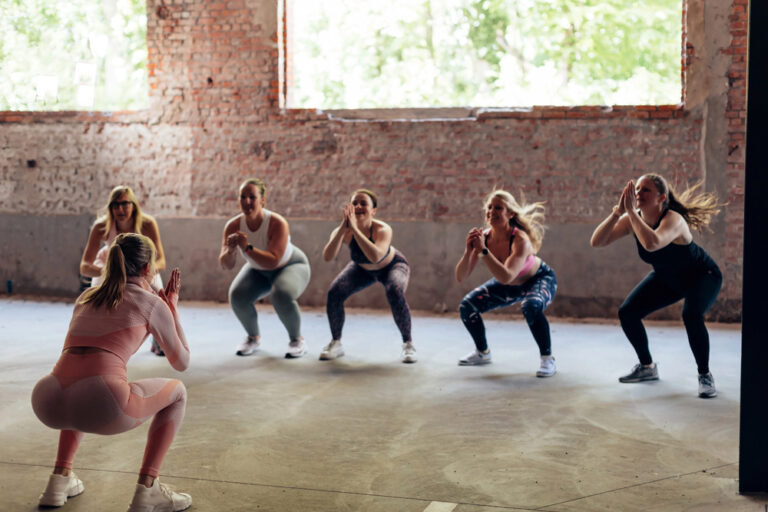
1. Why Morning Workouts for Women Are Game-Changing
For countless women juggling work, family, and personal goals, morning workouts represent more than fitness—they’re a ritual of empowerment. Starting your day with movement triggers a cascade of benefits: enhanced endorphins, sharper focus, better metabolism, and an improved mood that lasts well into the afternoon.
A consistent morning workout routine for women also resets the body’s circadian rhythm, promoting healthier sleep patterns and sustained energy. Studies show that women who exercise early experience 15% more daily productivity and report higher confidence levels throughout the day (Harvard Health, 2023).
2. The Science Behind Morning Energy and Hormones
Women’s hormones fluctuate throughout the month, influencing energy and performance. Morning workouts for women align beautifully with cortisol’s natural rise around dawn—helping convert this “alertness hormone” into motivation rather than stress.
Furthermore, research from the National Library of Medicine (2022) indicates that morning exercise improves fat oxidation and insulin sensitivity—especially beneficial for women balancing weight or managing hormonal changes such as perimenopause.
3. Building a Morning Routine That Actually Sticks
The hardest part isn’t doing a workout—it’s getting started consistently. Women succeed with morning workouts when they remove friction:
-
Prepare the night before: Lay out clothes, gear, and playlist.
-
Use micro-goals: Commit to just 10 minutes—momentum builds naturally.
-
Sync with sleep: Go to bed 30 minutes earlier to reclaim morning time.
The key is identity shift: don’t “try” to work out; be a woman who moves in the morning.
4. The 9 Most Energizing Morning Workouts for Women
Below are nine morning workouts that balance strength, cardio, and mindfulness—optimized for women’s bodies and lifestyles.
-
Yoga Flow (15–30 min) – Boosts flexibility, balance, and emotional clarity.
-
HIIT Circuits (20 min) – Short bursts of intensity elevate fat burn all day.
-
Brisk Walking or Jogging (30 min) – Enhances endurance and mood stability.
-
Pilates Mat Routine (25 min) – Strengthens the core and tones without bulk.
-
Bodyweight Sculpt (20 min) – Perfect for home workouts with no equipment.
-
Dance Fitness (30 min) – Elevates endorphins and makes exercise joyful.
-
Strength Training (30–45 min) – Builds lean muscle and bone density.
-
Cycling or Spin (40 min) – Ideal for cardiovascular health and stamina.
-
Mindful Stretch + Meditation (10–15 min) – Grounds your mindset for the day.
These morning workouts for women can be customized to fitness level, time, or mood—each one offering a different path to energy and empowerment.
5. Nutrition: The Unsung Partner of Morning Fitness
Fueling your body right makes all the difference. Women who eat a protein-rich, light pre-workout snack—like Greek yogurt, half a banana, or a small smoothie—experience more consistent energy and reduced fatigue.
Post-workout, refuel within 30 minutes using complex carbs (oats, quinoa, fruit) and clean protein (eggs, tofu, protein shake). Hydration is crucial—your body loses moisture overnight, so start with a glass of water before coffee.
Research from the Journal of Strength and Conditioning (2022) supports that balanced post-exercise nutrition accelerates recovery and muscle tone in women.
6. Mental Health Benefits: Confidence, Clarity, Calm
Morning workouts don’t just sculpt bodies—they shape mindsets. Exercise stimulates serotonin and dopamine, neurotransmitters responsible for happiness and motivation. Women report feeling more emotionally resilient after consistent morning movement.
Even low-intensity options like stretching or yoga have been shown to reduce symptoms of anxiety by up to 35% (American Psychological Association, 2024). The result? Clearer thinking, reduced stress, and a sense of daily accomplishment before breakfast.
7. Balancing Hormonal Health and Fatigue
Women experience unique energy rhythms due to estrogen and progesterone fluctuations. The best morning workouts for women adapt around these natural cycles:
-
Follicular phase (Days 1–14): Higher energy → try HIIT or strength sessions.
-
Luteal phase (Days 15–28): Shift to yoga, walking, or lighter resistance.
Listening to your body ensures sustainability. Overtraining can elevate cortisol and disrupt sleep. Instead, cycle your intensity to match hormonal changes—a smarter, more holistic approach to fitness.
8. How to Stay Consistent When Motivation Fades
Motivation is fleeting; systems endure. Try these habit-forming strategies:
-
Stack habits: Pair your morning workout with something enjoyable—like a podcast or sunlight exposure.
-
Accountability: Join a women’s online fitness group or challenge.
-
Track small wins: Use a journal or app to visualize progress.
A 2023 Behavioral Science study found that women who pair workouts with daily rituals (like morning coffee) are 47% more consistent over three months.
9. Real Women, Real Results
Thousands of women have transformed their lives through morning workouts. From busy professionals to mothers, they describe benefits such as improved mood, sharper focus, and long-term self-confidence.
“Morning workouts gave me the one thing I didn’t have—control over my day.”
— Emma R., 38, Denver, CO
Social accountability also drives success—sharing your routine publicly (even just with a friend) increases consistency by over 60%, according to Stanford Behavioral Health (2023).
10. Final Thoughts: Redefining Strength and Self-Care
At its core, morning workouts for women are not about burning calories—they’re about becoming the kind of woman who leads her day intentionally.
Whether it’s five minutes of stretching or forty minutes of strength training, morning movement builds mental clarity, emotional balance, and physical vitality.
Start small. Be consistent. Let every sunrise remind you that your strength is not something to find—it’s something to reclaim.
References
-
National Library of Medicine – Exercise Timing and Metabolic Health
-
American Psychological Association – Exercise and Mental Health
-
Journal of Strength and Conditioning Research – Post-Exercise Nutrition





